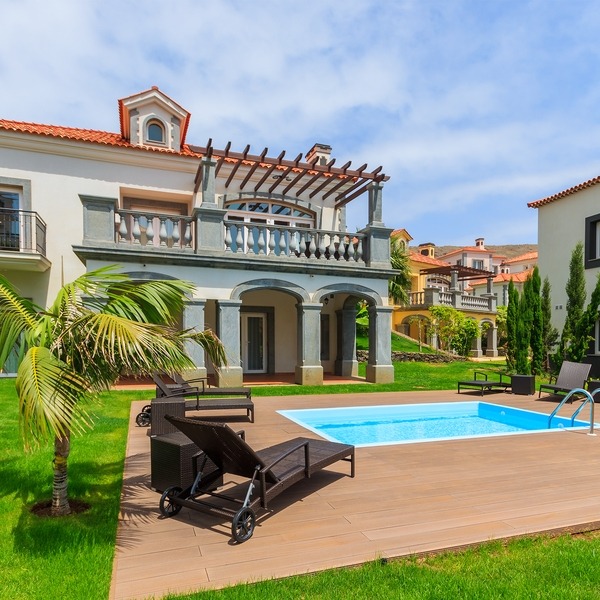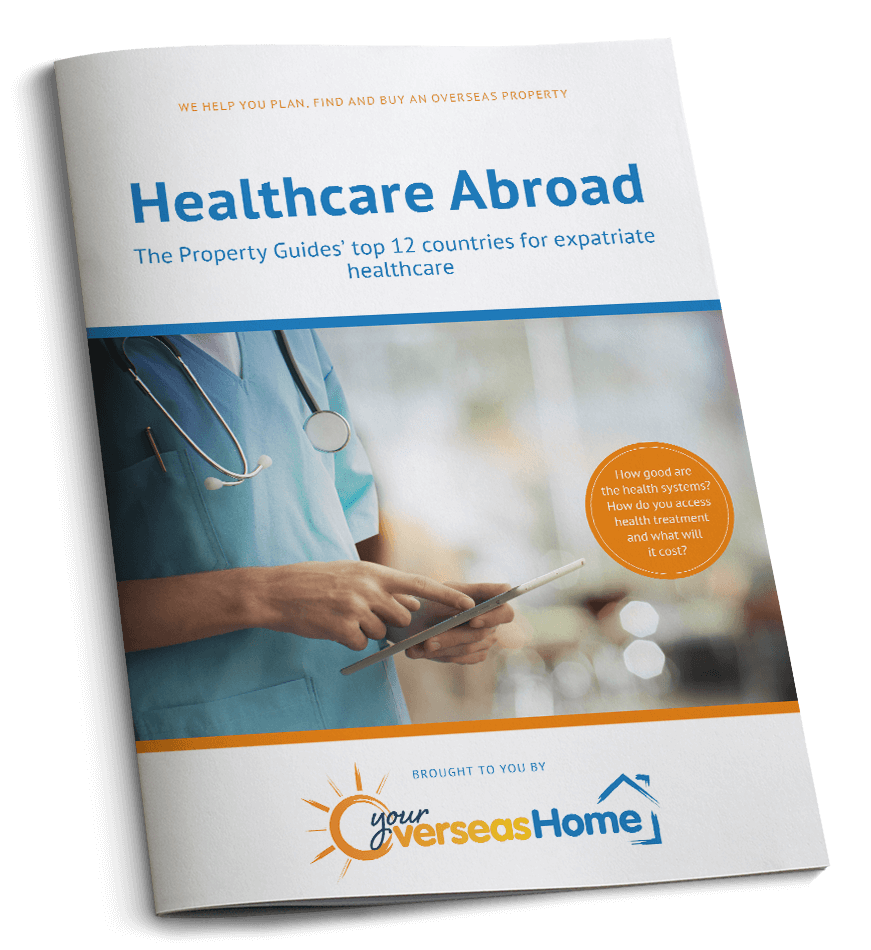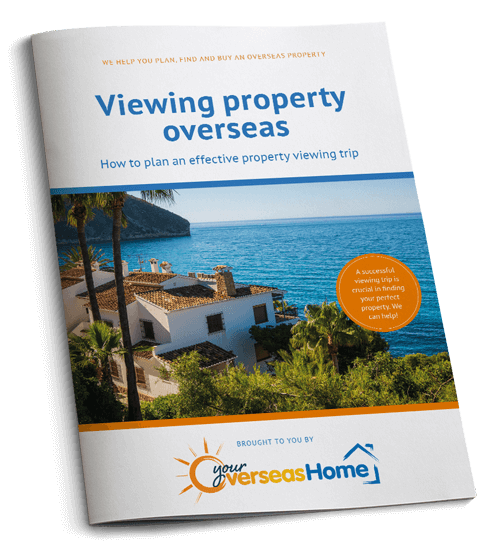If you’re dreaming of a life in the sun with a low cost of living, low crime rate, and a vibrant local culture then Portugal could be just what you’ve been looking for. Don’t just take our word for it, Portugal was named the 10th best European country for expats in the InterNations Expat Insider 2023 survey.
Whether you’re looking for a sun-drenched retirement, a safe place to bring up a family or an exciting new life as a single expat, Portugal has plenty to offer.No matter what your reason is for relocating, making the move abroad is a big life step that requires careful consideration and planning.. To help keep the process as stress-free as possible, we’ve put together our guide to moving to Portugal which includes everything you need to know before taking the leap into your next big adventure, including:
- Moving to Portugal FAQs
- EITAS for travel to/from the EU
- Buying property
- Financing your move
- Claiming your pension in Portugal
- Opening a Portuguese bank account
- Understanding Portugal visa requirements
- Applying for residency in Portugal
- Tax planning before moving to Portugal
- Tax planning after your purchase
- Portuguese fiscal numbers (NIF)
- Arranging healthcare in Portugal
- Organising removals
Moving to Portugal FAQs
As the UK has now left the EU, UK citizens no longer have the automatic right to live in Portugal. As a result, there are a few rules you’ll now need to bear in mind if you’re thinking of moving to Portugal from the UK after Brexit. The good news is that, of all the EU countries, Portugal is one of the easiest for non-EU nationals to gain residency in. Below are some of the things to consider when moving to Portugal after Brexit. Many of these procedures also apply to other ‘third-country nationals’.
Can I buy a house in Portugal?
The EU’s ‘four freedoms’ don’t cover property which means non-EU nationals like people from the UK, US, Australia, and Canada can currently purchase property. You’ll just need to ensure that, once you’ve bought it, you apply for the correct type of visa if necessary. A good lawyer can help you through this process.
=
How do I buy property in Portugal?
If you’re thinking of buying property, then simply follow the same buying process that you would have done pre-Brexit: start looking for your home, speak to estate agents, arrange a viewing trip, speak to currency exchange to sort out how to transfer your currency to euros and you’re good to go. The only additional layer will be visas, but you’ll have plenty of time to apply for one during the purchase process. You’ll only need it to move, not to buy a house.
What is healthcare like for expats in Portugal?
If you’re contributing to the Portuguese social security system, then you’ll be able to access Portuguese healthcare the same as Portuguese nationals. If you’re retired, then you’ll need to register for an S1 form. Our health section below discusses healthcare in Portugal in more detail.
Can non-EU citizens find a job in Portugal?
Yes, non-EU citizens will be able to work in Portugal after Brexit, but you’ll need a work permit and often a job offer.
How do Portuguese visas work?
Luckily, Portugal has a reasonably relaxed process for non-EU citizens to gain residency. If you’ll be coming from outside the EU, you can still travel to Portugal for up to 90 days in any six-month period. Nevertheless, if you want to spend longer than this in Portugal — perhaps you want to retire there or live there permanently — then you will need to apply for a visa.
- D7 Visa and D7 Residence Permit: If you have an income, whether that be a pension or through self-employment, this is another option to consider. The D7 will allow you to live in Portugal and travel freely within the EU, so is a great option post-Brexit.
The Golden Visa scheme that allowed foreigners to gain residency following a €500,000 investment in property was scrapped in February 2023. The Portuguese government is no longer granting new golden visas, but existing ones can be renewed. Read more on Portugal’s old golden visa scheme here.
If you’re from the UK and can prove you have been legally living in Portugal prior to 31 December 2020, you will be protected by the Brexit Withdrawal Agreement and will not need to apply for a visa. However, you should exchange your EU resident document for a new biometric card. You can do this using SEF’s Brexit portal.
ETIAS for travel to/from the EU
While not directly a result of Brexit, one thing you will soon need to bear in mind is The European Travel Information and Authorization System (ETIAS) — a system designed to screen travellers entering European countries. This will come into force from the end of 2022. UK citizens entering Portugal for less than 90 days will need to apply for an ETIAS.
It will be easy to obtain within minutes online and though you do pay an initial fee of £6, it will last for three years.
This will work much in the same way as the ESTA for the USA. Every person needs one, including children, however applicants under the age of 18 or over the age of 70 will receive their ETIAS free of charge. Failure to obtain an ETIAS means you may get turned away at the border (or refused boarding to your flight).
Buying property
Buying property can be a long process at the best of times, and even more so when you’re searching for a home abroad. We recommend you hire an estate agent, solicitor, and currency specialist to help you navigate the Portugal property market and the rules and regulations involved. We can put you in touch with fantastic solicitors with a lot of experience in this field. You may also want to hire the expertise of a financial advisor.
With your team organised, the next step is to start looking for property for sale in Portugal. Here at Portugal Property Guides, we have plenty of listings from all over the country, including Lisbon, Porto, and the Algarve.
Our comprehensive guide to buying property in Portugal should give you all the information you need to snap up your dream home. From finding a property to making an offer, this guide will explain it all. And don’t forget to take a look at our guide to planning a property viewing trip to get the most out of your visit.
Financing your move
While deciding on your dream property, it’s a good idea to consider early on how you’re going to pay for it. The decision of how you will finance your property will be the very first financial decision that you make once you know you are moving to Portugal, and there are a number of options you can choose from for this.
You will need to decide whether you can pay for your property through your own savings, through the sale or re-mortgage of your current UK property, or through one of many loan options. Unsurprisingly, the most common way of funding a property purchase in Portugal is through a mortgage and you may consider either a UK mortgage or one from a Portuguese mortgage provider.
Choosing a Portuguese mortgage
If you choose to purchase with a Portuguese mortgage, you will need to bear in mind that banks require a minimum 30% deposit from non-Portuguese nationals. This deposit will be based on the Loan-to-Value (LTV) of the property, not its sale price. You may also find that there is less choice available to you, which makes it prudent to discuss your options with an overseas mortgage broker when you can.
Bear in mind that options will usually change on a daily basis, and you will need to understand exactly what the requirements are for each one (particularly noting the documentation that you will need to produce, interest rates and terms of the loan, and the criteria you will need to achieve). We can put you in touch with a trusted overseas mortgage broker who can discuss your options with you.
Monthly repayments
One of the most important things you will need to consider is what the monthly repayment figure for your mortgage will be, and whether you will be able to afford this based on your finances. You want to make sure that your chosen mortgage option does not stretch you financially.
Think about your currency requirements
Once you have made your decision, it’s at this point that we recommend speaking to a currency specialist like our partners Smart Currency Exchange. This will ensure you can immediately begin considering your currency strategy and the options available to you.
Hidden costs
You may also need to be aware of any hidden costs before moving, such as fees and taxes. Our finance guides can help you through the process of funding your move and avoiding any financial pitfalls, so be sure to take a look.
Remember that your funds will be affected by fluctuating exchange rates too, so you may want to use a currency exchange specialist to help transfer your funds and make the most of your money.
Claiming your pension in Portugal
The practicalities of claiming your pension in Portugal are very important details to iron out if you plan to retire there. Portugal is hugely popular with British pensioners for many reasons. These include year-round good weather, a low cost of living, and a friendly, welcoming atmosphere. There are also potential tax benefits to living in Portugal as a pensioner.
If you plan to claim your pension in Portugal, you need to consider the best way to transfer it into the country. There’s also plenty to think about when it comes to if, how, and where you pay tax.
A tax-free pension in Portugal?
Portugal has attracted lots of global attention for its non-habitual resident taxation scheme. This allows many new residents with foreign-sourced income, including pensions, to take their income free of Portuguese income tax for up to ten years. This can make a move to Portugal a particularly enticing proposition!
There have been some rumours that this initiative could be curtailed. One rumour points to the potential of a 10% flat-rate tax on foreign pensions. It’s fair to say that this could still prove more attractive to prospective expats than taking their pension in their home country. At the time of writing, however, nothing about this has been confirmed. You are best advised to seek the advice of an independent financial advisor.
The practicalities of receiving your pension in Portugal
If you receive a UK state pension, this will usually be paid into your UK bank account. This means it’s essential to ensure this bank account remains active and accessible after your move. If you have money credited to the account regularly, your bank will usually not object to your changing your contact address to one in Portugal.
If this is how you receive your pension, the best way to draw this money out in Portugal is to set up a Regular Payments Plan. There is no fee for this service and all you will need to do is set up a standing order. This automatically sends your funds at a pre-agreed exchange rate, and at pre-agreed intervals (usually monthly for a UK pension). This gives you the chance to plan your budget with price certainty around exchange rates.
You should receive a pension claim form from the UK Pension Service in the months before you retire. If you move to Portugal before you receive this, you must make sure that they have your new address in Portugal. Otherwise, you could fail to receive important documentation. Just to be on the safe side, a mail redirection is a good idea too.
Taxes on pension income
As with all tax concerns, when it comes to tax on your pension, we would highly recommend speaking to a qualified financial advisor. They can assess the best options to ensure you don’t pay tax on the same funds twice. Furthermore, it’s definitely worthwhile discussing whether you qualify for the non-habitual residency scheme.
Fiscal residency in Portugal is determined by quite specific criteria. Broadly speaking, once you become legally resident in Portugal and cut ties with the UK, you will be taxed in Portugal on your worldwide income. One exception to this is if you are in receipt of a forces or public service pension, as these pensions are always liable for tax in the UK.
There are different tax criteria in Portugal, however. In many cases, you can find that a combination of schemes, tax deductions and allowances gives you more disposable income to fund your life in Portugal than you would have “back home.”
Opening a Portuguese bank account
It’s a good idea to open up a bank account in Portugal before you move. This can be useful when it comes to transferring money and making payments on a property. Opening a bank account is similar to here in the UK, and many banks will allow you to do this online. However, it’s still very common for people in Portugal to visit their branch in person. You can do this either by visiting the bank in Portugal or by heading to the UK branch of a Portuguese bank.
You’ll need to bring proof of ID, proof of address, and proof of employment or income to open a Portuguese bank account. You will also be asked for your Portuguese fiscal number or will be issued with one. You may need to have these documents authenticated by a notary, solicitor, or consulate. Once your account is open, you’ll be asked to make a starting deposit. This can vary, but it’s usually around €250.
You might find that banking in Portugal is a lot smoother and more personal than in the UK, and this isn’t the only difference. Take a look at our guide to banking in Portugal for more information, including the differences between Portuguese and UK banks.
Understanding Portugal visa requirements
If you’re a UK citizen and you’ll be in Portugal for less than 90 days within a 180-day period, for example if you’re viewing property, then normal rules apply after Brexit and you do not need to apply for a visa. To stay in Portugal for up to one year, you’ll need a temporary visa.
If you’re a UK citizen and you’ll be moving to Portugal full-time after Brexit, then you’ll need to apply for a visa. This is because the UK is no longer part of the European Union, so must follow the same rules as people from other non-EU countries such as the US, Canada, or Australia.
There are a range of Portuguese visa types to choose from to suit various conditions, including marriage, Schengen, and Golden visas. You can speak to our recommended visa specialist to get the most accurate information for your circumstances.
Schengen visa
A Schengen visa is a short-stay visa that allows the carrier to stay in any country within the Schengen area for up to 90 days in a 180-day period. Portugal is part of the Schengen area, and although the UK isn’t, British citizens are covered by a Schengen visa waiver. As a result, you do not need to apply for a visa if you’ll be residing in Portugal temporarily.
Golden visa
As of October 6th, 2023, you can no longer obtain the Portuguese golden visa via real estate investment. There remain other routes to qualify but they cannot directly or indirectly link to real estate. Alternate routes include:
- Investment by capital transfer for the acquisition of investment funds’ units or venture capital funds aimed at the capitalisation of Portuguese companies (at least €500,000)
- A capital transfer of at least €500,000 to be incorporated in a Portuguese business or increasing the share capital of a Portuguese business.
- The creation of at least 10 jobs
- Scientific research or technology contribution of at least €500,000
- Investment or donation in the arts or reconstruction of national heritage with a donation of at least €250,000 (Global Citizen Solutions, 2023)
For guidance on the Portuguese golden visa scheme, we recommend you speak to a trusted golden visa specialist.
Enquire with one of our trusted legal partners here.
D7 visa
Portugal’s D7 visa, sometimes called the retirement visa or passive income visa, is a popular option for non-EU citizens looking to gain residency in Portugal. The visa offers many benefits, including the right to live, work and access the public healthcare system in Portugal, as well as free movement within the Schengen Zone. What’s more, any family members and dependents can also benefit.
This visa is designed for people with a passive income (i.e. not your salaried income) of at least €7,620 per year. The first thing to be aware of is that the D7 visa is actually a two-stage process. You will first need to apply for a D7 visa (this can be done from the UK) which remains valid for four months. You will then need to travel to Portugal within this time and apply for a D7 residence permit. This can be done at the Immigration and Border Services (SEF).
To apply for a D7 residence visa, you’ll need to:
Prove you can support yourself with a passive income
As the name suggests, you will need to have a ‘passive income’. This essentially means that you are able to support yourself with funds that take ‘little to no effort to earn and maintain’ and not rely on a salaried income. You can have a salaried income, such as from a UK employer, but it will not count towards the required funds for the visa.
What qualifies as passive income?
- Pension
- Real estate
- Transferable equity
- Royalties
- Intellectual property
- Earnings from long term, fixed-rate financial investment
- Dividends as long as you are not employed by the company
- Interest from savings
How much passive income do I need?
You must have enough passive income to support yourself in Portugal. The Portuguese authorities quantify this as the equivalent to the Portuguese minimum wage. Currently, this is €8,460 per year (about €700 per month).
Does the amount of passive income required change if I am married?
Yes. You will need an additional 50% passive income for your spouse or another dependent adult. This works out at an additional €352.50 per month (or €4,230 per year). So, in total you would need to prove you have €12,690 per year of passive income.
Does the amount of passive income required change if I have children?
Yes. For each child under 18 you will need an additional 30% passive income. This works out at an additional €211.50 per month and €2,538 per year.
Example case study:
John and Sheila Smith are looking to move to Portugal from the UK to start a new life. They are married with two children under the age of 18.
John applies for the D7 visa for his family. Based on the additional costs for each member of his family, John must be able to prove that the family has an annual passive income of €17,766.
Obtain a Portuguese tax number (NIF) and open a Portuguese bank account
One of the very first things you should do when applying for the D7 visa is to get a Portuguese tax number (NIF). You can get a NIF number from the UK so do not need to travel to Portugal at this stage.
After you have received your NIF number, you can then open a Portuguese bank account. Single applicants of the D7 visa must then deposit at least €7,000 in this account, while married couples must deposit at least €10,500.
Provide proof of accommodation in Portugal
You will also need to provide proof of some form of long-term accommodation in Portugal. This does not need to be a bought property — long-term rentals (minimum lease of 12 months) are also sufficient.
Take out full health insurance
The primary applicant and any dependants must have comprehensive EU-wide health insurance that has been paid for in advance when applying for the D7 visa. Once you have residency, you can register for the Portuguese public healthcare system.
Have a clean criminal record
You must also have a clean criminal record. Ensure you obtain a DBS check before applying.
Meet the minimum stay requirements
Once you have your residence permit, you must stay in Portugal for at least six months and one day for it to remain valid. This can be in the form of 183 consecutive days in Portugal or eight months with various breaks throughout the year.
If you do not meet these minimum stay requirements, you risk losing your residency status.
How long does the residence permit last?
The initial residence permit is valid for two years. After this time, the permit can be renewed for an additional three years. After five years, the holder can apply for permanent residency.
Work visa
If you are an EU citizen, you do not need a visa to work in Portugal or any other EU country for any length of time. If you are from the UK or outside the EU, you cannot work in Portugal without a work permit, though you can do some things like attend meetings and conferences. You can apply to work in Portugal on their government website.
Student visa
If you’re a UK student who will be studying in Portugal for more than three months and less than one year, then you’ll need to apply for a student visa. You can usually apply for this from the Portuguese embassy or consulate here in the UK before you travel. Once you arrive in Portugal, you’ll then need to apply for a residence permit.
If you’ll be studying in Portugal for more than one year, you can apply with the SEF to get your student visa and residency renewed. You can do this for up to a period of five years.
If you’ll be studying in Portugal for less than three months, then you do not need to apply for a visa.
Applying for residency in Portugal
If you are an EU citizen, you are free to live and work in any EU country. For UK citizens who want residency, it’s a bit more complicated — but not impossible.
When moving to Portugal from the UK after Brexit, non-EU rules apply. You’ll need to request a residence permit and then you can apply for permanent residency after living there for five years.
Applying for a residence card
If you intend to stay in Portugal more than six months, you must register this with the local town hall (camara) within one month of your 90th day in Portugal and receive a residence card.
The document that you need to obtain is often referred to as “residencia”, but the correct name for this is the Certificado de registo de cidadao da uniao Europeia. This is usually issued for an initial five years and if you are still resident after this time, you can apply for permanent residency.
According to the official instructions, you must visit the camara with just your passport and be prepared to sign and declare that you either:
- have work in Portugal
- are self-employed
- have sufficient funds to support yourself and your family
- have valid medical insurance
This documentation is usually sufficient, but in some cases, new residents have been asked for other documents as wide-ranging as bank statements, translated employment contracts, and social security declarations. So, it’s best to take a huge folder of all imaginable paperwork, just in case!
D7 residency
If you’ve been granted a D7 visa, then you’ll be able to apply for a D7 residence permit. As previously mentioned, this will be valid for two years and you can then extend it for another three years. After five years, you’ll be able to apply for permanent residency.
Once you’ve been granted a D7 residence permit, you’ll need to reside in Portugal for at least six months and one day for it to be valid. This can be in the form of 183 consecutive days in Portugal or eight months with various breaks throughout the year.
Non-habitual residency scheme
Portugal’s non-habitual residency programme was launched in 2009 but ended in December 2023. This scheme offered foreign residents the opportunity to pay a special low, flat tax rate on their Portuguese income and no tax on foreign income, including pensions.
For more information, head to Chase Buchanan
Pension income
If you’re planning to move to Portugal and benefit from the non-habitual resident scheme, you will find that most UK pension income fits in perfectly with the rules. Both UK state pensions and private pensions shouldn’t be taxed in Portugal for the ten-year period.
One notable exception is UK government pensions. These are always taxed in the UK. As such, if you have something like a police, fire service, or civil service pension, you may find that that isn’t covered under the scheme. In addition, it’s worth knowing that lump sum payments are treated differently to regular pension payments. If you plan to draw from your pension in this way, it’s best to speak to your accountant. They will help you to look at the most tax-efficient way of handing things.
How do you sign up for non-habitual residency in Portugal?
It’s possible to apply for non-habitual resident status via Portugal’s Financas website. As such you can — in theory — go through the process and do all the paperwork yourself.
In reality, it’s best to seek assistance from somebody familiar with the procedure. As with much of the bureaucracy in Portugal, you’ll probably be asked for lots of supplementary information. The process can be daunting if you’re unfamiliar with it. It’s also complicated to handle if you’re not fluent in Portuguese.
The Golden Resident Programme
Portugal’s golden visa, or residency by investment, was a hugely successful scheme of Portuguese (and therefore EU) residency in return for investing in property or business. Successful applicants gained the right to live and work in Portugal. As of March 2023, the Portuguese Golden Visa scheme is no longer operational.
Citizenship through marriage
Any foreign national who has been married to a Portuguese citizen for three years can apply for citizenship. You do not need to have lived in Portugal for the three years, but you will need to prove your connection to the Portuguese community (such as proof of knowledge of the Portuguese language).
Tax planning before moving to Portugal
One of the biggest benefits of emigrating to Portugal is the low tax rate. Before you move, you’ll need to be familiar with the way taxes work overseas. Your worldwide estate and how it will be affected must be one of your highest considerations when you’re moving to Portugal. How can you ensure that you can continually maximise your income and the interest from your pensions and other assets, even after you leave the UK?
There are a number of things that you must do before you go, including notifying HMRC about your departure from the UK. This is a formality, especially as there could be tax implications from leaving behind a let property in the UK, but it could also result in a tax rebate for you.
Bureaucracy can be tricky to navigate in Portugal as experiences can differ from place to place. One of the best ways to look at this is by seeking the advice of a professional, independent financial advisor, who will be able to discuss your situation with you and assess your options. We’d also recommend familiarising yourself with the fundamentals of tax planning before your move to Portugal.
Pension
If you are moving to Portugal under retirement age, you may find that there are UK state pension benefits to continuing National Insurance contributions after you have moved. If you are already paying into your UK pension, you may be able to continue paying in and receive tax relief.
Savings policies
It’s really important to assess your life insurance or savings policies before you go, to see how relevant these will be in your new life in Portugal. You will also need to look at any ISAs that you have, because you will generally find that non-residents of the UK can no longer contribute to these. Additionally, if you hold large cash balances in the UK, it would be wise to decide what to do with this.
Taxation
If you deal with tax returns in the UK, you will need to make sure that you act correctly with these — especially as there are often significant penalties for the late submission of these. You will also need to discuss inheritance laws and any other taxation that may affect you — Portuguese laws will often be different from those you are used to in the UK, so you will need to make sure everything is protected.
Residency
You will also need to assess the implications of the Statutory Residence Test and your residence status.
Currency exchange
If you will be relying on a UK-based pension and/or income from investments, it’s really important to understand that currency exchange can cause issues. As the market rates fluctuate, so too will your monthly income in line with the exchange rate. A currency exchange specialist like Smart Currency Exchange can offer you assistance and the necessary tools to set the exchange rate for up to a year on regular payments from the UK.
Documentation
You will also need to make sure that your paperwork is in order. We recommend filling in HMRC’s P85 ‘Leaving the UK’ form, preferably before you leave the UK although it can be done retrospectively if necessary. This informs the UK Government that you are becoming a resident of another country. If you are continuing to work for a UK company, you may be granted an “NT” (no tax) code, allowing your employer to pay you gross of tax. You will, of course, become liable to pay tax in Portugal instead!
Tax planning after your purchase
Once you have purchased property in Portugal, you will need to assess what tax considerations will affect you.
The tax year
The Portuguese tax year follows the calendar year (Jan to Dec), which can be something that some expats struggle to get their heads around at first. Tax return completion dates depend on a number of factors, such as your types of income and how your file your return. The paper filing deadline for those who earn only salary or pension income is March 31, while for other types of income this is April 30. For those filing online, the deadlines are one month later for each option.
Income tax
In theory, you are (legally at least) fiscally resident in Portugal if you spend more than 183 days in the country during one year. You will therefore need to know exactly what this means for your tax situation, especially if you still pay (or need to pay) tax in the UK. All incomes, even any in the UK that you still pay tax on, must be declared on your Portuguese tax return — but you won’t pay tax on the same income twice thanks to the double taxation treaty. You may, however, find that you are liable for higher rate tax on some aspects if you are fiscally resident in Portugal, so you will need to pay the difference.
Deadlines for the payment of income tax will usually be several months after filing, but these have been known to change so make sure you are in touch with a professional tax adviser to ensure you do not end up having to pay a fine for a missed deadline.
Second home owners
You may not need to complete a tax return if you do not live in the country long enough to require residency — but make sure you check this with an accountant. If you rent your property out, you must declare this and pay the appropriate tax on your rental income.
Social security and healthcare
You may only receive healthcare and benefits in Portugal if you pay into the social security system — unless you are over 65 and in possession of an S1 document from the UK. How you make these payments will depend on your employment status and you may well have to make significantly higher contributions than you might expect if you are self-employed, making it very important to assess this.
Other types of tax
In addition to income tax and social security, you will need to consider whether you are required to pay IMI property tax, and if you are liable for capital gains tax if and when you sell your Portuguese property.
Non-habitual tax benefits
As previously mentioned, the non-habitual residency scheme allows those with a UK pension who are fiscally resident in Portugal to receive their pension tax-free for ten years.
This regime was introduced in 2009, aiming to attract new people to Portugal and make it beneficial from a tax-perspective to become resident in Portugal. There are a number of benefits that those meeting the criteria can take advantage of, including:
- Tax exemptions
- Passing on wealth without inheritance or gift taxes
- Enjoying retirement without tax on their pensions
It’s really important to make sure you speak to a solicitor to go through your paperwork and assess if you are eligible for this scheme.
Whatever your tax concerns for living in Portugal, the most prudent thing that you can do is speak to a Portuguese lawyer with extensive knowledge of tax planning. We recommend speaking to a trusted legal professional who can help you through the process.
Portuguese fiscal numbers (NIF)
The Portuguese fiscal number (the Numero de Indentificacao Fiscal, or NIF), is hugely important. The closest British equivalent is the National Insurance number, but the NIF in Portugal is used for far more. You’ll certainly need it to buy a property or obtain a visa, but you are also asked for it for smaller things such as buying a mobile phone. Your NIF can be issued by your local tax office (Finanças) or a citizen’s shop, or by opening a bank account in Portugal.
Since the UK left the European Union, it is a legal requirement to appoint a tax representative to obtain your NIF number for you. We go into more detail on this in our guide to appointing a tax representative in Portugal, but essentially, your tax representative can be any individual or business with a fiscal address or head office in Portugal — you just need to have a Portuguese address to send the NIF details to.
This could be a family member or friend who is resident in Portugal, but they must be willing to receive any NIF communications and deal with any taxes. Alternatively, you can use an accountant, solicitor, or lawyer.
Of all the paperwork in Portugal, the NIF is one of the easiest things to get. If you’re serious about buying a Portuguese home, it’s worth obtaining one sooner rather than later. Nowadays there are even online services that help you get one from a distance — just ensure you do your due diligence on such services.
Arranging healthcare in Portugal
Portugal has a similar national health service to the one you will be used to in the UK, known as the Serviço Nacional de Saúde (SNS). But the main difference between the NHS and the SNS can come as a bit of a shock to British people (although not for arrivals from other countries), as it is part-paid rather than free. That means you will have to pay small ‘user fees’ (taxas moderadoras) for everything from tests to GP visits. So, Portugal does have universal healthcare, but not in the same way we are used to.
It is important to know that you will not automatically qualify for Portuguese healthcare. You’ll first need to become a legal resident and contribute to Portugal’s social security system (generally through employment of some kind).
Registering for healthcare
Everyone who’s registered as a resident can also register to access the Portuguese national health service (SNS) on the same basis as a Portuguese citizen. This applies if you’re employed, self-employed or not working. How much you pay will depend on what you’re being treated for and how you’ve accessed the healthcare system.
If you are moving to Portugal on a visa, you will need health insurance for the duration of your visa and until you have residency in Portugal.
To register for healthcare, you’ll need to go to your local health centre (centro de saúde) with:
- A residence certificate,
- Your passport,
- Your tax identification number, or Número de Identificação Fiscal (NIF), from your local tax office (finanças),
- Your social security number, or Número de Identificação de Segurança Social (NISS), if you’re employed or self-employed (you can request this from your employer, or your local tax office).
To find out more about how to register, head to the UK Government’s website for advice regarding Portuguese healthcare.
Once you’ve registered, you’ll get a health number (número de utente de saúde) that you can use to access the Portugal healthcare system.
The Portuguese health service is funded through general taxation and social security contributions by those who are employed. If you are a retired resident of Portugal and receive a UK State Pension, you could be entitled to state healthcare paid for by the UK by filling in an S1 form.
Of course, there is also the option of taking out private health insurance. Many Portuguese citizens opt for this route. Private healthcare policies often cover additional costs and services not covered by the public healthcare system, as well as speeding up waiting times for treatment.
Will I still have access to the NHS?
If you are planning on moving to Portugal now or have moved since the beginning of the year, you don’t automatically retain your right to NHS services. This is because the NHS is a resident-based system, so you need to be ordinarily resident to access its services. There are some small exceptions to this, such as if you are a student.
On the whole, if you are moving to Portugal from this point onwards, you won’t retain access to the NHS. When you are travelling back to the UK, ensure that you have travel insurance. If you need primary care — for example, to visit A&E or the GP — you won’t be charged, but anything beyond this wouldn’t be covered.
If you live in Portugal, you may be entitled to a Portuguese EHIC to use when you return to the UK. This card allows you to receive medical assistance during a temporary stay in the countries of the European Union, Iceland, Liechtenstein, Norway, or Switzerland. The EHIC will cover you for emergency needs in the UK.
Private clinics in Portugal
There’s absolutely no reason not to depend on Portugal’s state medical system for everything. Many people rave about the quality of care they receive. But if you do want more options, Portugal has a wealth of choice in paid alternatives.
If you’d like to receive quicker treatment than you would under the SNS, then you may choose to pay for a private medical clinic instead. The primary reason for using private facilities in Portugal is a simple matter of convenience. If an appointment could involve waiting half a day or more, or driving to a hospital 50 miles away, it can prove cheaper for working people to pay for private care than it would to miss out on that day’s income.
Portugal’s private medical facilities aren’t cheap, but they’re nowhere near as expensive as in the US or northern Europe. As such, many people prefer to pay €40 or so (approximately £32) to see a private doctor immediately, rather than waiting for a state GP appointment.
Some people may choose private facilities as a way to gain access to better pregnancy and birth services. Portugal has good maternity facilities on the whole, but some hospitals are quite “set in their ways” in terms of how they do things. People wanting a more modern experience, with birthing plans and more involvement from the father, opt to go private. Modern private hospitals charge in the region of €4,000 (around £3,400) for a birth, assuming no complications.
Health insurance in Portugal
If you are a resident of Portugal but you don’t qualify for Portugal’s healthcare system, or if you wish to complement what you do receive, you may well choose to take out private medical insurance. Many people in Portugal choose to take out health insurance policies that part-pay for private treatment. As an example, these people could often see a private doctor for as little as €10–20 instead of the normal rate, with the rest funded by insurance. In many clinics this kind of scenario accounts for much of the footfall.
There are a number of options when it comes to private health insurance, with the choice of a Portuguese insurer or an international company to gain Europe-wide or global cover.
The cost of cover can vary, and your age will play a huge part in the cost difference. Gaining cover for pre-existing conditions can be complex, so it’s wise to enlist the help of an insurance broker who can help to explain the difference between the policies.
Private healthcare policies may well be more affordable than you expect and finding out the cost now could help you budget for your new life in Portugal. If you’re wondering where to find health insurance for expats in Portugal, get in touch. We can put you in contact with a health insurance provider who can protect you at a reasonable cost.
Will my EHIC or GHIC work in Portugal?
The purpose of a European Health Insurance Card (EHIC) or a Global Health Insurance Card (GHIC) is to help tourists in emergency situations. It does not cover non-urgent treatment or private medical care, and as such is not a substitute for medical insurance. It will, however, allow you to access healthcare while you’re in Portugal temporarily, such as when you’re viewing properties.
The good news is that you can still use your EHIC or GHIC after Brexit. Reciprocal healthcare is continuing, meaning that there is a healthcare agreement in place between the UK and the EU. This includes the use of the EHIC and new GHIC cards, both of which are valid until they expire. You just need to make sure you take them to a public hospital or health centre, as they are not accepted within private healthcare.
When your EHIC card expires, just visit the GHIC portal and apply for one. Your EHIC will remain valid until it expires. It’s important to remember, however, that these cards are generally used for emergencies only and should be supplemented with full health or travel insurance. There are certain things that they don’t cover, such as medical repatriation.
These cards are handy for those who are going to visit their holiday home or going to Portugal for a holiday. However, if you are moving there permanently, you should register with the Portuguese healthcare system.
Healthcare for pensioners
The agreement that the UK has made with the EU for reciprocal healthcare means things continue pretty much as they were before for UK state pensioners. If you’re a pensioner, you need to apply for an S1 form via the overseas healthcare service, which you are eligible to apply for once you receive your state pension. You then need to register this form locally (in Portugal) for this to take effect. You can also include dependents on that, such as a spouse, a civil partner, children under 26, and so on.
The important point to remember is that this entitles you to the same healthcare that a Portuguese pensioner receives, rather than what you would receive in the UK from the NHS. This means that most things are free, such as general medicine, primary care and secondary care. However other things, such as dental care, would need to be paid for. There is also usually a small charge on prescriptions.
Health benefits from employment
Once you begin working in Portugal, it is worth checking if your new employer provides any kind of health benefits. If they do, make sure you find out if there is a period of time that has to pass before they kick in — for example, you may not be eligible for benefits until your probationary period is over. If this is the case, you will need to take out insurance to cover you in the interim period.
Pharmacies and prescription medicines
As in the UK, you should find a pharmacy in most town centres and malls. Medications are subsidised, and if you have the correct prescription, your medication will be at very low cost. As some medication can be quite expensive without prescription, you may find that your GP offers you a prescription for cough medicine or painkillers, which will save you money in the pharmacy.
If you are on regular medication already, you can bring these with you to Portugal, providing you have paperwork to confirm that this is for personal use only.
Emergency services
The national emergency number in Portugal is 112, the European common emergency number. There is also a health line for emergencies on 808 242 424. Operators can usually answer the calls in English if need be.
Organising removals
Removals to Portugal are something you’ll need to start researching as soon as you know that you are definitely moving there. You have three main options to choose from when deciding how to tackle your removals to Portugal. You can:
- use a removals company,
- hire a “man with a van”, or
- buy or rent a van and do it yourself.
Choosing a removals company
There are numerous removal firms that make regular trips between the UK and Portugal. We would strongly recommend choosing a member of The British Association of Removers (BAR) or the International Association of Movers (IAM). Best of all is to choose a company that’s recommended heartily by people who’ve already made their move.
One of the first things that you need to check when choosing a removals company is their approach to insurance. Does the policy cover your possessions while in storage and awaiting removal? Does it cover possessions while in transit by sea (marine insurance)? Are your possessions still insured once they arrive in Portugal, but before they are delivered to you?
The best time to start to arrange your removals to Portugal is three to six months before the move date. The company will usually need to visit your home to survey your belongings for a quote. However, for smaller loads, you can sometimes agree a fixed load size in cubic metres.
The removal firm will also need to fit you into their schedule. The better the company, the busier it will usually be! Check whether the company will also pack your goods. It is sometimes better to pay a few extra pounds to have your belongings professionally packed. This is especially relevant if the company won’t guarantee goods that they’ve not packed themselves.
Make sure the removal company notes the contents of each box. Furthermore, make sure you have a complete inventory of all possessions packed. Keep your essential items to hand at all times. Remember that all your possessions could be in transit for weeks, so you will need to pack carefully to make sure everything you need is kept in a safe place. Once your possessions are packed and loaded, you won’t see them until you get to Portugal!
Finally, set aside all the keys for your current accommodation, your car and your office. Label them clearly and be ready to hand them over to the right people before you leave.
Find your own “man with a van”
A “man with a van” is a great alternative for small loads. You will find that several advertise in English language newspapers in Portugal. A “man with a van” will likely offer a more personal and flexible service. However, once the cost of fuel, ferry, and road tolls are all added in, it is unlikely to save a substantial amount of money. One exception is if the van space is shared between several customers in the same area.
It’s equally important to look at insurance if you use a “man with a van.” If you’re transporting particularly valuable items, a professional removal service may be a better bet, just to ensure you’re correctly insured.
Make sure you are involved
Whether you choose a specialist in removals to Portugal or a “man with a van”, the basic rules are the same:
- Keep a detailed inventory with an approximate value of each item
- Ensure you have adequate, valid insurance.
As the UK is no longer part of the EU after Brexit, you will need to apply for a baggage certificate from the Portuguese Consulate in the UK (as long as you have lived outside the EU for more than 12 months). You’ll also need an inventory of the goods being shipped, a signed declaration of ownership (witnessed by a notary), and proof of residency in Portugal. Make sure you insist that the transporter signs the inventory and keep a copy for yourself.
Above all, exercise the same caution you would with any business transaction. Ensure you use a company or individual you trust and seek referrals if required. Finally, check for registration with the professional bodies detailed above.
Do the removals to Portugal by yourself
The final option of using a van and doing all the work yourself is one that many potential expats consider at some point. If you are bringing pets, it could make perfect sense — especially if a road journey to Portugal is already on the cards. There are, however, several factors to consider.
By the time you have added together the cost of EU motor insurance, road tolls, fuel, and overnight stops, the price may be in excess of the quote from a removals firm. Driving a vehicle also means you end up with that vehicle in Portugal. It will either need to be eventually matriculated (sometimes a difficult process) or returned to the UK.
Take your time, do your sums, and compare all the options. Whichever method you choose will already have been experienced by plenty of expats in Portugal. As such, don’t be afraid to hit the internet forums and seek advice on removal firms, costs, and routes.
Protect yourself
Whatever method of moving you choose, make sure you are protected from identity theft. Ensure you shred all those bits of paper, old bank statements, and bills that you don’t want to keep. You could even use the shredded paper as packing material.
Comply with all regulations
It is important to comply with regulations when your possessions enter a new country. Your removal company will usually give you a specific list of what can and cannot enter Portugal during your initial survey. If in doubt, ask!
Usually, you will need to:
- Drain all petrol and oil out of lawnmowers and similar equipment before transportation. This is to ensure they comply with fire regulations.
- Remove all batteries (e.g. from torches and radios), as they can leak in transit and damage your equipment.
- Clean any garden tools and garden furniture. This is because items with soil on them may be denied entry at customs.
You should also check your electrical equipment and whether it will work in your new home. This is rarely a problem with anything taken from the UK to Portugal, although you will need plenty of three to two pin adapters!
Have you thought about storage?
If you are not moving into your new home straight away, you will need to think about storage. It could prove cheaper to store your possessions in Portugal rather than your home country.
As with so many things related to moving abroad, the more advance planning you do, the more money and stress you’ll save. Removals to Portugal aren’t unduly complicated once you’ve worked out your preferred method.
Moving to Portugal from the UK is an incredibly exciting step, but there can be a lot to think about before relocating. Portugal Property Guides can offer a wealth of advice, from buying a property and navigating Portugal visas and residency, to organising healthcare and insurance in Portugal, we can help you at every step of the journey. We also offer plenty more in-depth guides to help you get settled into your new home and make the most out of living in Portugal, so be sure to take a look.
Sources used: Your Overseas Home Cost of Living 2023 Index, InterNations Expat 2023 Survey, Healthcare in Portugal, SchengenVisaInfo, Europa Travel ETIAS, Royal Mail Post Redirection, InterNations.Org, SEF, Smart Currency Exchange, HMRC, IMI tax.
You can also find a great selection of downloadable booklets, including a version of our Portugal Property Guide:
Buying in Portugal – Relevant, up-to-date information and tips from Portugal property experts and expats on how to buy property in Portugal.
Healthcare Abroad in 2018 – Taking care of your health doesn’t stop when moving to Portugal. Get this one stop shop for expatriate healthcare.
Your Viewing Trip Guide – A handy guide to everything you need to know for planning a successful property viewing trip in Portugal.
A Property Buyer’s Guide to Currency – A currency specialist’s ‘insider’s guide’ to a successful property purchase, written by the experts.

Julia Hope,
Your Portugal Buying Specialist
Speak to an expert
Though we cover almost every angle of buying property in Portugal in this guide, it's perfectly understandable if you've still got some questions! You can contact our team of Portugal experts on +44 (0)20 7898 0549 from Monday–Friday, 8:30am–6:00pm or email [email protected].
We can assist you with almost anything to do with your relocation, whether you need advice on what to do next in the buying process or how to start planning your viewing trip. We can also use our proven network of connections to put you in touch with:
- Estate agents
- Currency specialists
- Solicitors
- Independent financial advisers
- Property surveyors











